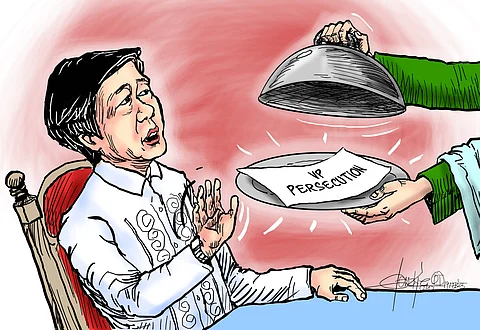
- NEWS
- the EDIT
- COMMENTARY
- BUSINESS
- LIFE
- SHOW
- ACTION
- GLOBAL GOALS
- SNAPS
- DYARYO TIRADA
- MORE

During the impeachment of the late Chief Justice Renato Corona, former President Benigno Aquino III played a behind-the-scenes role that ultimately led to Corona’s conviction and removal from office.
The impeachment trial of Vice President Sara Duterte, however, presents a different scenario. President Ferdinand Marcos Jr. has expressed his opposition to the divisive proceedings, and he is expected to stand firm on his position.
After Corona’s death on 29 April 2016, Marcos, then a senator, issued a brief statement that reflected his resentment over the anguish that was brought to bear on the late magistrate.
In the statement, Marcos firmly stated that Corona was a victim of “selective justice.” His ouster was a great injustice, according to Marcos, and “it is unfortunate that at the time of his death, he was still under this cloud that remained over him since the impeachment trial.”
Marcos was among the three senators who voted to acquit CJ Corona against the 20 who found him guilty based on Article 2 of the impeachment complaint filed against him for his failure to disclose to the public his statement of Assets, Liabilities and Net Worth (SALN).
Marcos joined Miriam Defensor-Santiago and Joker Arroyo, who have both passed away, in finding Corona innocent of the charges.
In his message, Marcos expressed his belief that “if there had been any violations of the law by the Chief Justice, these violations do not rise to the level of an impeachable offense.”
His stand was meant to preserve stability in government as he indicated that “the impeachment process redefines the relationship between the branches of government, and the resulting instability can put the future of Filipinos and the country in limbo.”
Mr. Marcos cited the oath that the senator-judges took to “do impartial justice according to the Constitution and the laws of the Philippines.”
He then made clear his resentment of the use of government resources to influence the outcome of the proceedings.
“And nowhere is this precept (impartial justice) more apposite than in this case where the government has mustered all the resources at its disposal not only to secure evidence against the Chief Justice but, further, to ensure his conviction.”
Moreover, Mr. Marcos believed the crucial issues “that have piqued the interest of the senator-judges as well as the public were outside the original ambit of the impeachment complaint and have been brought forth only after its filing.”
He also cited instances when the evidence came from “questionable” sources, “beginning with the unidentified ‘little lady’ to documents anonymously left on gates and in mailboxes.”
Mr. Marcos’ resistance to keeping from discussing the trial was also the result of his position in the Corona impeachment that “at the expense of the sub judice rule, evidence had been presented to the public on several occasions, even before they were formally offered before this Court.”
Also mentioned was the grossly exaggerated information with the apparent intention to predispose the public mind against the Chief Justice.
“Notable examples would be the Land Registration Authority report with the discredited list of 45 properties and the unauthenticated AMLC report claiming that the Chief Justice allegedly owned $10 million.”
To Mr. Marcos, the Chief Justice sufficiently addressed the accusations against him with regard to the filing of his SALN, and the disclosure of his real properties and peso and dollar deposits.
The President made an uncanny prediction in his statement.
“When the furor has died down and this political storm has subsided, I know — that like Lady Justice — we shall find solace in the fact that this decision, though maybe not popular, was fair, impartial and just.”
Indeed, Corona is now believed to have been persecuted because at the start of his term, based on a collegial 14-0 decision, the Supreme Court ordered the distribution of almost 5,000 hectares of land to some 6,000 farm workers of Hacienda Luisita Inc., the sugar plantation owned by the Cojuangco side of President Aquino’s family.
